| |
SYNOPSIS
Two modern American
teenagers are sucked into their television set and
end up living in a black-and-white fifties sitcom.
Bewildered by their new world's naivete and innocence,
they slowly start to add color and spice to the
town's life. Eventually, however, they begin to
question their influence, wondering if their advanced
90's attitudes are really that much better than
those of the innocent past. Sterling effects and
stand-out performances make this commentary on modern
life a poignant, entertaining effort.
|
SELECTED
REVIEW
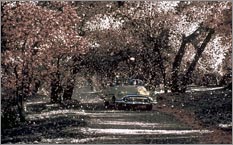
Welcome to a world where Father knows best, where
Mother cooks dinner, and where Sister and Brother's
small missteps are treated with stern-but-kind
lectures. It's a realm where everyone is nice
to one another, where neighbors greet each other
with a kind word, and where there's never any
sign of lingering ill will. Obviously, this is
not a real place, nor was it ever. In fact, it's
the landscape of homogenous, black-and-white '50s
television, the bastion of clean living and family
values that has recently found a new generation
of viewers through repeats on nostalgia cable
channels like Nickelodeon.
There never was a program
called Pleasantville, but the feel of this supposed
old-time TV sitcom, as presented through the movie
of the same name, so accurately captures the essence
of '50s and '60s shows like Father Knows Best,
My Three Sons, and The Donna Reed Show that it
might as well occupy a slot in the "Nick
at Night" lineup. With a gentle, affectionate
mocking, director Gary Ross (making his directorial
debut after writing Big and Dave) lampoons the
quaintness of such TV programs by rigorously building
a model that adheres to the formula, then slowly
pulling it down over the course of two hours.
Pleasantville is about the falseness of family
values and the need of the individual to break
through society's shield of conformity, but, most
of all, it's about having fun at the expense of
nostalgia.
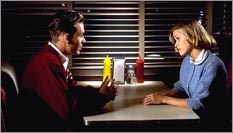
Pleasantville opens in the comfortable familiarity
of the '90s, with a common '90s family - David
(Tobey Maguire) and Jennifer (Reese Witherspoon)
are the twin children of a broken marriage. They
live with a mother who's never around. One night,
a mysterious television repair man (Don Knotts)
shows up at the door and gives David a "special"
remote control for the set. Later, as he's settling
down to watch a 24 hour marathon of his favorite
show, Pleasantville, he and his sister struggle
over the remote. In the process, something very
strange happens.
Suddenly, they are no longer
in their home. In fact, they're no longer in color.
They have entered the black-and-white world of
'50s television, where the temperature is always
72 degrees, it never rains, profanity is never
spoken, sex is taboo, there are no toilets, and
words like "swell", "gee- whiz",
and "keen" are part of the regular vocabulary.
David is thrilled with the change in events. After
all, Pleasantville is his favorite program. Jennifer,
on the other hand, is horrified ("I'm pasty!"
she screams upon seeing her gray complexion).
She wants to go back immediately. She doesn't
like the idea of having a perfect Dad in George
(William H. Macy) and a perfect Mom in Betty (Joan
Allen). But the gateway the two teens entered
appears to be one-way, so they have to make do
with their new world. Soon, however, David and
Jennifer's "radical" ideals are bringing
about changes in their environment. Perfection
begins slipping away. Colors start to dot the
black-and-white vistas. Jealousy, anger, and passion
make appearances. The stale utopia of family values
begins evolving.
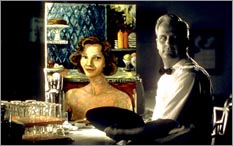
The most stunning thing about Pleasantville is
the film's look, which rivals that of the year's
other two most visually-impressive productions,
Dark City and What Dreams May Come. Color is used
purposefully and impressively; it's hard to describe
the impact of seeing one red rose amidst the black
and white, or one monochromatic person in a sea
of green grass. Ross has a reason for every change
in hue, and the way he gradually evolves the film
from pure black and white to a vibrant cacophony
of colors is stirring. According to the press
notes, this movie necessitated a whole new type
of digital special effects. The first "full
color" scene in Pleasantville (when the local
kids are gathering in a park) is stunning. The
movie needs to be seen more than once to absorb
exactly how the color scheme has been constructed
and executed.
On a thematic level, there
are similarities between this film and The Truman
Show, especially since both deal with reality
vs. unreality and the importance of individual
freedom. There are some differences, as well.
Truman lives his life on television, and his actions
affect those outside in the real world. David
and Jennifer, on the other hand, also live their
lives on television, but their actions affect
only those inside the television world. It's a
contemporary version of "Alice in Wonderland."
Some might also notice similarities to Woody Allen's
The Purple Rose of Cairo, although this is essentially
that approach in reverse. Here, it's real people
traveling to an imaginary land, as opposed to
the opposite, which occurs in Allen's movie.
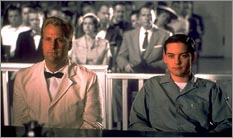
The performances, while not Shakespearean, are
all solid. Tobey Maguire (The Ice Storm) plays
the kind of nice, likable boy whom the audience
can identify with. He has an easy charm that's
hard to dismiss. Reese Witherspoon (Twilight)
gets to play the bad girl/good girl dual role,
and is effective as both. William H. Macy is delightfully
deadpan as the Father Knows Best who's frightened
by the gradual transformation of his town. Also
in the cast are Joan Allen, Jeff Daniels (as the
proprietor of a soda shop who discovers a love
of art), and the late J.T. Walsh (as an influential
resident who opposes all change).
One of the things I liked
best about Pleasantville is that, while it entertains
with its quirky plot and stunning visuals, it
also made me think. Too few movies manage to be
both thought-provoking and thoroughly entertaining.
Pleasantville is a tour de force - it's a magical,
modern-day fairy tale that invites us to explore
who we are, and, like The Wizard of Oz and It's
a Wonderful Life (heady company indeed), it trumpets
the messages that the individual can make a difference,
and that life in an alternate reality isn't necessarily
better, just different. There's even room for
a parable about racism ("No coloreds allowed").
Not only is Pleasantville a satire, a fantasy,
and a visual marvel, but it's the best kind of
feel-good movie.
James Berardinelli
REELVIEWS
|
MEMORABLE
QUOTES
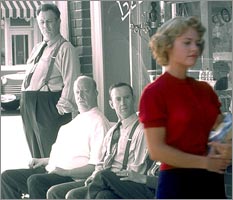
David: They're happy like this.
Jennifer: No, David. Nobody's happy in a poodle
skirt and a sweater set.
Betty Parker: Mary Sue?
Jennifer: Yeah?
Betty Parker: What goes on up at Lover's Lane?
Jennifer: What do you mean?
Betty Parker: Well, you hear these things lately...kids
spending so much time up there. Uh, is it holding
hands? That kind of thing?
Jennifer: Yeah! That and...
Betty Parker: What?
Jennifer: It doesn't matter.
Betty Parker: No, I wanna know.
Jennifer: Well, sex.
Betty Parker: Oh. What's sex?
Jennifer: I did the slut thing, David. It got
kinda old.
David: We're supposed to be in school.
Jennifer: We're supposed to be at home, David.
We're supposed to be in color!
George Parker: Where's my dinner?
[After Mary Sue explains to Betty about sex.]
Betty Parker: Your father would never do anything
like that.
Jennifer: Ohhh. Hmm. Well, you know Mom, there
are ways to enjoy yourself without Dad.
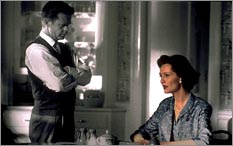
Big Bob: Everybody really likes you, George.
George Parker: Oh. Well...
Big Bob: No! They do! And it's not just 'cause
you're a good bowler. It's 'cause people respect
you!
Skip: Hiya, Bud!
David: Hiya, Skip!
Skip: Hiya, Bud!
David: Hiya, Skip!
Skip: Bud, can I ask you a question?
David: Sure.
Skip: Well, if I was to go up to your sister...
What I mean is, if I was to go up to Mary Sue...
David: Oh my God... are we in that episode?
Jennifer: Can I ask you a question?
David: Sure.
Jennifer: How come I'm still in black and white?
David: What?
Jennifer: I've had ten times as much sex as the
rest of these girls, and I still look like this.
I mean, they spend an hour in the back seat of
some car and all the sudden they're in Technicolor?
David: I don't know. Maybe it's not just the sex.
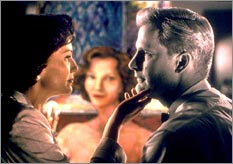
David's Mom: When your father was here, I used
to think, "This was it. This is the way it
was always going to be. I had the right house.
I had the right car. I had the right life."
David: There is no right house. There is no right
car.
David's Mom: God, my face must look like a mess.
David: It looks great.
David's Mom: It's really sweet of you but I'm
sure it does not look great.
David: Sure it does. Come here.
David's Mom: I'm 40 years old. I mean it's not
supposed to be like this.
David: It's not supposed to be anything. Hold
still.
David's Mom: How'd you get so smart all of a sudden?
David: I had a good day.
Jennifer: I knew you'd pay a price for this. I
knew you couldn't be so hopelessly geek-ridden
for so long without suffering some really tragic
consequences.
Big Bob: Up until now everything around here has
been, well, pleasant. Recently certain things
have become unpleasant. Now, it seems to me that
the first thing we have to do is to separate out
the things that are pleasant from the things that
are unpleasant.
George Parker: Honey! I'm home.
Bill Johnson: ...Don't you think?
David: I think you should try not to think about
that anymore.
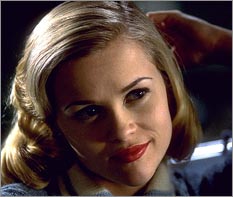
George Parker: You know, your mom went out.
David: Went out?
George Parker: Yeah
David: When?
George Parker: Three days ago
David: People change.
George Parker: People change?
David: Yeah
George Parker: Can they change back?
David: I don't know. I think it's harder
David: Yeah, where's our lawyer?
Big Bob: Oh, I think we want to keep these proceedings
as pleasant as possible.
George Parker: So what's going to happen now?
Betty Parker: I don't know. Do you know what's
going to happen now?
George Parker: No
[laughing]
George Parker: ...I don't!
Bill Johnson: I guess I don't either.
David: Fire! Fire! Fire! Fire!....Cat?
Bud Parker: I know you miss her, I mean, you told
me you did. But maybe it's not just the cooking
or the cleaning you miss. Maybe it's something
else. Maybe you can't even describe it. Maybe
you only know it when it's gone. Maybe it's like
there's whole piece of you that's missing too.
Look at her, dad. Doesn't she look pretty like
that? Doesn't she look just as beautiful as the
first time you met her? Do you really want her
back the way she was? Doesn't she just look wonderful?
Now don't you wish you could tell her that?
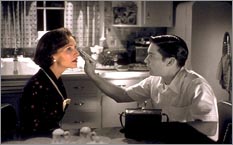
Skip: I don't know if I ever told you this before,
but I think you're just about the keenest girl
in the whole school!
Jennifer: Oh, really Skip? The keenest?
Jennifer: HELLO! I've got like three pounds of
underwear on here!
Jennifer: This place gives me the creeps! Did
you know that the books are blank?
Bud Parker: What?
Jennifer: Yeah, I was in the library and I looked,
and they have covers and there's nothing inside
of them.
Bud Parker: What were you doing in a library?
Jennifer: I got lost.
|
TRIVIA
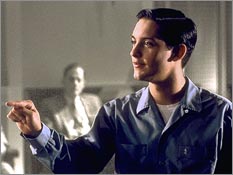
Filmed entirely in color,
which was then removed for the black-and-white portions
of the film.
Early appearances of color:
the red rose, after the encounter at Lover's Lane;
pink bubblegum seen in the hallway at school;
one girl's pink tongue;
the red hearts of the cards in the bridge hand;
the subtle green of the car in front of the diner;
the pink cherry blossoms reflected in the side mirror
of the car;
the subtle green of the grass at Lover's Lane before
it turns completely colorized.
Jeff Daniels also
appeared in Purple Rose of Cairo, The (1985),
another film in which black-and-white and color
characters intermingle.
Tobey Maguire and Joan Allen also played mother
and son in Ice Storm, The (1997).
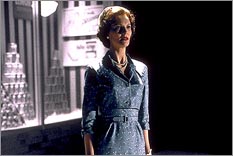
Some of the cinematography in the scene at the
town meeting recall similar scenes at the Nazi
rallies in Leni Riefenstahl's Triumph of the Will.
Director Gary Ross acknowledges these cinematographic
homages:
The scene of J. T. Walsh in front of the bowling
alley scorecard recalls Patton's speech in front
of the American flag in Patton (1970);
The courtroom segregated into black-and-white
characters downstairs and "colored"
characters upstairs recalls To Kill a Mockingbird
(1962);
The scene in which Toby Maguire spins in the rain
recalls Shawshank Redemption, The (1994).
The Native American
in the test pattern behind Don Knotts changes
to angry and then sad as the movie progresses.
During the publicity campaign surrounding the
film's release, there was a contest for a trip
to Pleasantville, Iowa (the smallest Pleasantville
in the United States).
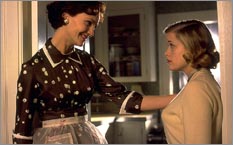
The bowling alley score sheet shows that all frames
have been strikes or spares.
The downtown set was used in Back to the Future
(1985).
The two books that Bud (David) narrates to the
teenagers of Pleasantville, "The Adventures
of Huckleberry Finn" and "Catcher in
the Rye," are the two most widely banned
books in the United States.
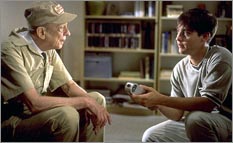
In the original screenplay, the TV Repairman was
to be played by Dick Van Dyke and the name of
the repair company was Rob's TV Repair (Rob was
Van Dyke's name on his first show) In a subsequent
draft, the name in the script was simply TV Repairman,
leaving room for Don Knotts.
When Jennifer enters Pleasentville, she becomes
a character named Mary-Sue. "Mary-Sue"
is a term that originated in fan fiction to describe
a character who comes into the character's lives
and completely solves all of their problems.
|
|
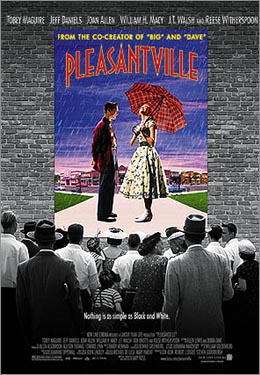
|
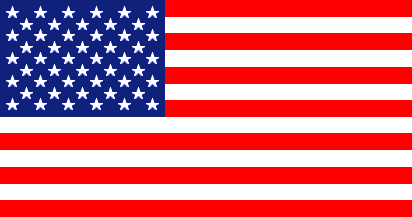
BASIC INFO
United States, 1998
U.S. Release
Date: 10/23/98
(wide)
Running Length:
1:56
MPAA Classification:
PG-13 (Mature themes, sexual situations, mild profanity)
Theatrical Aspect
Ratio: 1.85:1
Director:
Gary Ross
Producers:
Jon Kilik, Robert J. Debus, Steven Soderbergh, Gary
Ross
Screenplay:
Gary Ross
Cinematography:
John Lindley
Music:
Randy Newman
U.S. Distributor:
New Line Cinema
In English
|
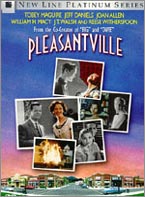
DVD FEATURES
DVD Features
Region 1
Keep Case
Widescreen 1.85
Audio
Dolby Digital 5.1 English
Dolby Surround English
Additional Release
Material
Audio Commentary 1. Gary Ross Director
2. Steven Soderbergh Producer
3. Randy Newman Composer
Featurette 1. The Making of Pleasantville
Trailer 1. Original Theatrical
Music Video 1. Fiona Apple
Interactive Features
Interactive Menus
DVD-ROM Material
Screenplay
|
KEYWORDS
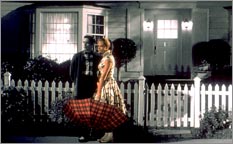
discrimination,
fascism, small-town, 1990s, basketball, masturbation-scene,
painting, 1950s, innocence, television, bathtub-scene,
highschool, bowling, color, teen, intolerance,
rain, remote-control, book, eiffel-tower-paris,
utopia, acceptance-of-change, art, book-burning,
brother-sister-relationship, censorship, courtroom,
diner, jukebox, library, mural, soda-shop, malt-shop,
title-spoken-by-character
|
| CAST
& CREW
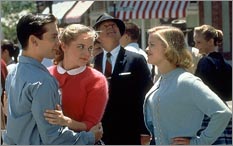
William H. Macy ....
George Parker
Joan Allen
.... Betty Parker
Natalie Ramsey
.... Real Mary Sue Parker
Kevin Connors
.... Real Bud Parker
Jeff Daniels
.... Mr. Bill Johnson
Tobey Maguire
.... David Wagner
Heather McGill
.... Girl in School Yard
Paul Morgan
Stetler ....
College Counselor
Denise Y. Dowse
.... Health Teacher (as Denise Dowse)
McNally Sagal
.... Science Teacher
Jane Kaczmarek
.... David's and Jennifer's Mom
Giuseppe Andrews
.... Howard
Reese Witherspoon
.... Jennifer Wagner
Marissa Ribisi
.... Kimmy
Jenny Lewis
(I) .... Christin
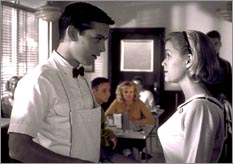
|
|

